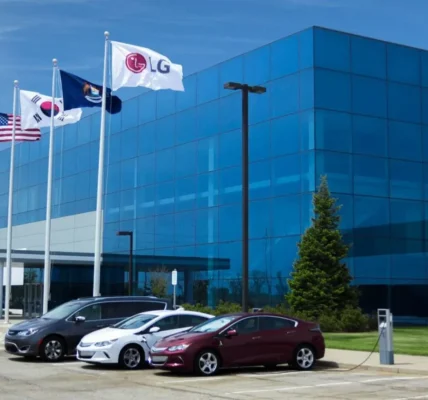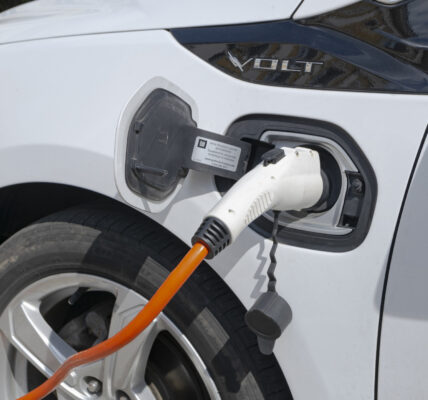One common criticism for EV fast charging plugs is that they’re chunky and big, or as the internet slang goes, they’re “chonky” like a fat cat. Probably the best example of this criticism was when Aptera promoted its petition for Congress to mandate Tesla’s much smaller and more elegant plug be the US standard instead of CCS. While that petition may have been a publicity stunt or an attempt to get Elon Musk’s attention (among other theories I’ve come across), they still have a great point. CCS plugs, especially when fed by a huge liquid-cooled cable, tend to be pretty tough to handle. CHAdeMO plugs are even bigger in most cases, like something you’d see on an aircraft carrier.
But, I’ve got some bad news. If you’re deeply bothered by the chunky size of CCS and CHAdeMO plugs, do yourself a favour and don’t keep reading this article, because the small tears you may be shedding over CCS will turn into a nervous breakdown and possibly a brain bleed once you see what’s coming to a truckstop or airport near you.
When the Looney Tunes animators set out to make Wabbit Twouble back in 1941, they probably had no idea that what they drew would end up becoming a popular internet meme in 2017-19. When mocking a very fat version of Elmer Fudd, Bugs Bunny blows himself up into a very obese rabbit, at least temporarily. Since then, “big chungus” has become a symbol for anything that’s huge, big, or otherwise larger than life.
Now, we’re seeing EV charging go in that direction. Why? Because the CCS charging plug is only rated for around 350 kW, and future over-the-road semi-trucks, aeroplanes, and other large vehicles that need to charge with over a megawatt of power need a chunkier plug to get that power safely into their battery packs.
Why the even bigger plug? Because the new MCS prototype connector is only for DC fast charging. If you want to use AC charging of any kind, whether it’s 120-volt “trickle charging,” 240 volts “Level 2” charging, or 3-phase AC charging using an industrial connection, the vehicle will also need to have a CCS plug. So, the triangular plug is even chunkier when you consider it will need to live alongside a CCS plug.
I don’t have any idea what the chances are for Atlis’ proposed MCS plug to succeed, because I have no knowledge of internal politics for CharIN (the body that decides these things). But, given that it could be an everything plug for medium, heavy-duty, and shipping/aviation, it does make a lot of sense.
It really doesn’t matter that much what plug semi-trucks, small ships, and aircraft are used for charging plugs. Those plugs don’t really need to be “elegant” as much as they need to work well and be durable. Function rules over form when it comes to industrial and heavy-duty work. So, why does it matter if MCS plugs will be chunky AF?
It doesn’t make a lot of sense to me personally, but there’s an obsession with replicating the gas station experience with DC fast charging. To get even a sedan or hatchback to charge up in five minutes, you’re probably talking about megawatt-level charging. 10 and 15-minute charging is already a reality with 350 kW CCS plugs, and I don’t think it’s worth the added expense and energy usage just to shave off 5-10 minutes.
A human being, even when riding in an autonomous vehicle, will want to get out, stretch their legs, grab a snack or drink, and pee from time to time, and you can’t do that in five minutes. Gas car drivers fuel up and then park by the convenience store or truck stop, so they aren’t hitting the road in 5 minutes either, in most cases.
But, the idiotic obsession with 5-minute charging is a sticky idea, even if based mostly on falsehoods. So, there will be cars and pickup trucks with MCS plug in a few years. This will make a lot of sense for something like a future F-350 Lightning or a Silverado EV HD because their big battery packs will need megawatt charging just to fill up in a half hour and take a 20,000-pound trailer further down the interstate. But, some manufacturers will decide that the big plug is needed on a sedan or a hatchback just to shave off a couple of minutes of charging time that nobody needs to save.
At this point, it’s probably wise for the EV industry and community to start talking about this. Aesthetics and ease of use are only the tips of what could be an environmentally devastating and grid-straining trend in EV charging.
First and foremost, we need to make sure efficiency remains part of the conversation. Instead of feeding megawatts of power into an EV, we need to encourage manufacturers to not abandon efficiency so recklessly. Everyone doesn’t need to be driving an Aptera, but we could erase the gains of an EV transition if everyone started driving things like the Hummer EV and larger just because it’s cheaper and “green” now.
The other thing we need to talk about is where the MCS plugs get installed. It makes sense to put MCS stations at truck stops, airports, and docks. It makes sense to put one or two of them at a normal charging station for larger pickup trucks and medium-duty vehicles (U-Hauls, box trucks, RVs) to use when hauling big loads, too. However, it makes almost zero sense for them to be available at every stall like CCS and CHAdeMO plugs are today.
We also need to question the wisdom of giant battery packs and rapid charging for most large electric vehicles. There are many, many medium and heavy-duty vehicles that never take long trips today. They often sit all night next to a warehouse or sorting facility and then drive only a few dozen miles on their normal daily delivery route every day. Nobody needs megawatt charging for such short-range vehicles that aren’t used 24/7, and getting people to needlessly replicate the gas station experience for those vehicles is wasteful and expensive.
If we can keep megawatt charging in the niche roles it belongs in, it really doesn’t matter how chunky the plugs are for those vehicles. But, if we’re dumb and let thoughtless fools push the industry to use the MCS plug for everything from motorcycles to bread vans, we’re doing ourselves a huge disservice.








